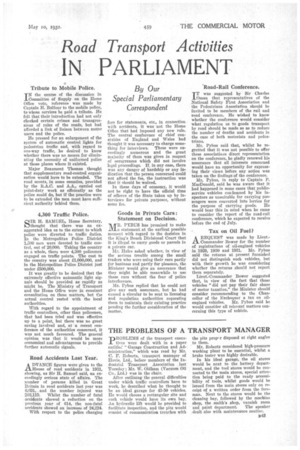Road Transport Activities
Page 57

If you've noticed an error in this article please click here to report it so we can fix it.
IN PARLIAMENT
By Our Special Parliamentary Correspondent
Tribute to Mobile Police.
IN the course of the discussion in Committee of Supply on the Home Office vote, reference was made by Captain H. Balfour to the mobile police, to whose services he paid a tribute. He felt that their introduction had not only checked certain crimes and transgressions of rules of the roads, but lied afforded a link of liaison between motor users and the police.
He pressed for an enlargement of the system of automatic control lights for pedestrian traffic and, with regard to one-way traffic, he desired to know whether there was no means for eliminating the necessity of uniformed police at those places where it existed.
Major Beaumont Thomas thought that supplementary road-control organization would have to be extended. The road scoots in some counties, provided by the RIC. and A.A., carried out point-duty work as efficiently as the police could do, but if the practice were to be extended the men must have sufficient authority behind them.
4,300 Traffic Police.
SIR H. SAMUEL, Home Secretary, thought that there was an exaggerated idea as to the extent to which police were diverted to traffic duties. In the Metropolitan Police District 1,500 men were devoted to traffic control, out of 20,000. Taking the country as a whole, there were 4,300 policemen engaged on traffic points. The cost to the country was about 11,000,000, and in the Metropolitan Police District just under 1500,000.
It was greatly to be desired that the extremely effective automatic light signals should be provided as rapidly as might be. The Ministry of Transport and the Home Offiee were in constant consultation on these matters, but the actual control rested with the local authorities.
With regard to the appointment of traffic controllers, other than policemen, that had been tried and was effective up to a point, but there WRS no great saving involved and, at a recent conference of the authorities concerned, it was not much favoured. The general opinion was that it would be more economical and advantageous to provide further automatic signals.
Road Accidents Last Year.
ADVANCE figures were given to the House of road accidents in 1931, showing, as Sir H. Samuel said, an exceedingly serious state of affairs. The number of persons killed in Great Britain in road accidents last year was 6,691, and the number injured was 202,119. Whilst the number of fatal accidents showed a reduction on the previous year of 614, the non-fatal accidents showed an increase of 24,224.
With respect to the police charging fees for statements, etc., in connection with accidents, it was not the Home Office that had imposed any new rule. The central conference of ehief constables of England and Wales had thought it was necessary to charge something for interviews. These were exceedingly numerous and the great majority of them was given in respect of occurrences which did not involve legal proceedings. If, in any case, there was any danger of hardship or any indication that the person concerned could not afford the fee, the instruction was that it should be waived.
In these days of economy, it would not be right to have the official time of officers of the State taken up by interviews for private purposes, without some fee.
Goods in Private Cars: Statement on Decision.
iurn. PYBIIS has promised to make _aria statement at the earliest possible moment with regard to the decision in the King's Bench Divisional Court that it is illegal to carry goods or parcels in a private car.
Mr. Hales asked whether, in view of the serious trouble among the small traders who were using their cars partly for business and partly for pleasure, the Minister would give an assurance that they might be able meanwhile to use those cars without the fear of police interference.
Mr. Pybus replied that he could not give any such assurance, but he had caused a circular to be sent to licensing and regulation authorities requesting them to maintain their existing practice pending the further consideration of the matter.
Road-Rail Conference.
IT was suggested by Sir Charles 0man that representatives of the National Safety First Association and the Pedestrians Association should be invited to be members of the rail and road conference. He wished to know whether the conference would consider what regulation as to goods transport by road should be made so as to reduce the number of deaths and accidents in the case of both motorists and pedestrians.
Mr. Pybus said that, whilst he regretted that it was not possible to offer these associatioas direct representation on the conference, he gladly renewed his assurance that all interests concerned would have an opportunity for expressing their views before any action was taken on the findings of the conference.
Mr. Pybus, in reply to Captain P. MacDonald, said he was aware that it had happened in some cases that publicservice 'vehicles condemned by 'his inspectors as unsuitable for carrying passengers were converted into lorries for the purpose of carrying goods. He would bear this in mind when he came to consider the report of the road-rail conference, which he expected to receive before the end of july.
Tax on Oil Fuel?
AREQUEST was made by Lieut.Commander Bower for the number of registrations of oil-engined vehicles in 1929, 1930 and 193L Mr. Pybus said the returns at present furnished did not distinguish such vehicles, but with their growth he was considering whether the returns should not report them separately.
Lieut-Commander Bower suggested that, in view of the fact that those vehicles "did not pay their fair share of motor taxation," the Minister should consider recommending to the Chancellor of the Exchequer a tax on oil engined vehicles. Mr. Pybus said he would consider all relevant matters concerning this type of vehicle.




























































































